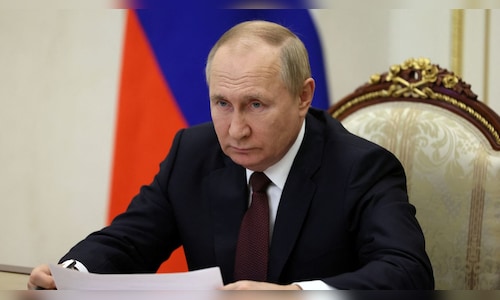However, following more than three years of conflict, President Donald Trump has suggested the possibility of rekindling U.S.-Russia trade contingent on a peace agreement. Russian President Vladimir Putin has indicated that foreign companies could return under certain conditions.
“Russia is eager to engage in extensive TRADE with the United States once this ‘catastrophic bloodbath’ concludes, and I concur,” Trump stated after conversing with Putin.
“There exists a tremendous opportunity for Russia to generate significant employment and wealth. The potential is UNLIMITED.” Trump later altered his tone regarding Putin after severe drone and missile strikes on Kyiv, calling him “absolutely crazy” and hinting at impending sanctions. Recent remarks from Putin cautioned Western companies against reclaiming their former stakes, suggesting the challenges that lie ahead for businesses considering a return to Russia.
The business landscape in Russia has dramatically shifted since 2022, and not in a way that favors foreign enterprises.
Read More: Trump announces plans to double steel and aluminum tariffs to 50%
With Putin intensifying assaults and maintaining territorial demands that Ukraine is unlikely to accept, a peace agreement seems quite distant.
Here are factors that could prevent U.S. companies from returning: Risk of losing it all. Russian legislation categorizes Ukraine’s allies as “unfriendly states,” imposing substantial restrictions on businesses from over 50 nations. These restrictions include limitations on cash and equipment withdrawals and allow the Russian government to seize control of companies considered vital. Votes from foreign owners on boards of directors can be legally ignored.
Companies that exited were compelled to sell their assets for 50% or less of their assessed value, or they chose to write them off as Kremlin-friendly groups acquired their assets at a discount. A 2023 presidential decree saw the Russian government take control of Finnish energy firm Fortum, German power provider Unipro, France’s dairy giant Danone, and Danish brewer Carlsberg.
Even if a peace agreement alleviated the U.S.’s status as an unfriendly entity and lifted the stringent Western sanctions restricting business in Russia, the memory of losses would remain. There are scant indications any of this is forthcoming.
While the Russian government has generally discussed the return of companies, “there’s no specific evidence of any single company stating they are prepared to return,” remarked Chris Weafer, CEO of Macro-Advisory Ltd. consultancy. “It’s all largely rhetoric.” Russia’s actions and legal modifications have left “long-lasting damage” to its business climate, according to Elina Ribakova, a non-resident senior fellow at the Bruegel research institute in Brussels.
She expressed skepticism about the likelihood of U.S. businesses returning. In a meeting at the Kremlin on May 26 for Russian Entrepreneurs Day, Putin asserted the necessity for Russia to constrain large tech firms like Zoom and Microsoft, which had curtailed services in Russia following the Ukraine invasion, to allow domestic tech companies to flourish instead.
“We need to strangle them,” Putin declared. “After all, they are attempting to strangle us: we need to reciprocate. We didn’t expel anyone; we didn’t interfere with anyone. We extended the most favorable conditions for their operation here, in our market, and they are attempting to strangle us.” He assured a representative from Vkusno-i Tochka (Tasty-period), the Russian firm that took over McDonald’s franchises in Russia, that Moscow would support them if the U.S. fast-food chain sought to reclaim its previous locations. In response to inquiries, McDonald’s reiterated its 2022 statement that “ownership of the business in Russia is no longer tenable.” With limited advantages, the challenging business environment in Russia, coupled with anticipated stagnation due to insufficient investment in sectors beyond the military, adds further to the caution.
“Russia possesses one of the lowest projected long-term growth rates and one of the highest levels of country risk globally,” remarked Heli Simola, senior economist at the Bank of Finland in a blog post. “Only Belarus presents a similarly poor combination of growth potential and risk.” Most profitable opportunities seem to be linked to military production, and U.S. companies are unlikely to engage with the Russian military-industrial sector, Ribakova noted. “It remains unclear where one could effectively invest and expect substantial returns that compensate for such a negative investment atmosphere.” Repurchase agreements have been arranged by some companies, including Renault and Ford Motor Co., allowing them to buy back their stakes if circumstances improve. However, given Russia’s fluctuating legal landscape, this remains uncertain.
Russian buyers might attempt to renegotiate the terms, demand additional funds, or disregard the agreements, according to Weafer. “There’s considerable uncertainty surrounding the enforcement of those buyback agreements.” But what about the oil and gas sector? Multinational oil companies endured significant losses while exiting Russia, raising questions about their willingness to re-enter, even with Russia’s immense oil and gas reserves. U.S. giant ExxonMobil, for instance, had its stake in the Sakhalin oil project terminated unilaterally, resulting in a $3.4 billion write-off.
Russian oil companies today have less reliance on foreign partnerships compared to the early post-Soviet period, although smaller oil field service firms might consider re-entry, given the scale of Russia’s oil industry. However, new regulations regarding local presence and investments would complicate such efforts, suggested Weafer.
Interestingly, some companies never left. According to the Kyiv School of Economics, 2,329 foreign firms continue operations in Russia, many from China or other nations not allied with Ukraine, while 1,344 are in the process of exiting and 494 have completely departed. The Yale School of Management’s Chief Executive Leadership Institute identifies roughly two dozen U.S. companies still active in Russia, with around 100 more having curtailed operations by suspending new investments.
EU sanctions may persist even if U.S. restrictions are lifted. U.S. sanctions are regarded as the most stringent, as they carry the risk of being excluded from the U.S. banking and financial system. Nonetheless, the EU continues to implement new rounds of sanctions against Russia. Even if U.S. sanctions are alleviated, EU penalties would still pose significant compliance challenges for any company aiming to operate in Europe.



